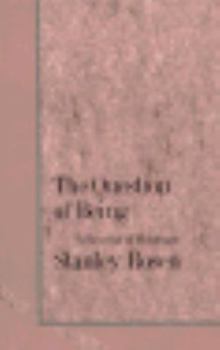The Question of Being: A Reversal of Heidegger
Select Format
Select Condition 
Book Overview
In this book a distinguished philosopher enters into a debate with Heidegger in order to provide a justification of metaphysics. Stanley Rosen presents a fresh interpretation of metaphysics that... This description may be from another edition of this product.
Format:Hardcover
Language:English
ISBN:0300053568
ISBN13:9780300053562
Release Date:April 1993
Publisher:Yale University Press
Length:341 Pages
Weight:1.60 lbs.
Dimensions:1.3" x 6.3" x 9.5"
Customer Reviews
2 ratings
Not for the faint of heart
Published by Thriftbooks.com User , 23 years ago
While I agree with the previous reviewer's assessment of Rosen's originality it seems that there is a bit of confusion which I think should be clarified. This book is a careful, profoundly original discussion of Heidegger's misunderstanding of Plato and how it fundamentally colored the rest of his thinking. In order to clarify where Heidegger went wrong Rosen deems it necessary to embark on lengthy, difficult discussions of Plato, Aristotle, Kant, and Nietzsche. He also deems it necessary to take an occasional swipe at some of Heidegger's less-talented progeny as they are oblivious to the very difficulties their misreadings imply and their influence within the Academy is undeniable. Furthermore, in the case of Plato, it becomes necessary to "save" the dialogues from their many positivist admirers and interpreters. The tone of the book is not so much polemical as exegetical, and it is studded with Rosen's subtle humor. [N.B. This may be the source of the previous reviewer's accusations of "arrogance" ie. the self-confidence of the knower as opposed to the tentative gropings of the blind.] Rosen's "platonism" is not the neo-platonism which has been handed down to us by Iamblichus, Albinus, and Plotinus but a substantially "deeper" platonism which does not assume that the dialogues were loaded with metaphysical dogma. To paraphrase Rosen, the history of "platonism" begins with Aristotle. From this standpoint the literary structure of the dialogues are as important as the allegedly "technical" discussions of "doctrines" which have been canonized in the secondary literature. Rosen's sympathies always lie with Plato but he is very careful to cite instances where he agrees with Heidegger, Nietzsche, or Kant. Indeed, his judicious and balanced discussions of these men lay bare the fundamental problems which each philosopher was attempting to confront and overcome. He does not, however, spare any of these men when their conclusions went awry. No sound writing should avoid this responsibility, though it can be done well or done poorly, depending upon the writer. The book engages in a lengthy discussion of Heidegger's misinterpretation of "greek ontology" and in particular with regards to Plato. Rosen demonstrates the untenability of Heidegger's claims about a "general concept of being" animating greek philosophy. He also engages in an original reading of the central section of Plato's "Phaedo" as a way of contrasting Plato's slippery discussion with Heidegger's static, professorial interpretation. In effect we are led to realize that Heidegger read into Plato (and Aristotle) what he wanted to in order to make certain claims about them later on. Rosen also spends a bit of time on Heidegger's own political nihilism which he perceives as being fundamentally grounded in his philosophy. Along the way Rosen points out how Nietzsche's claims to having overcome Plato are really just less coherent instances of a quasi-platonic teaching and that Kan
rigorous, quirky, and more than a little arrogant
Published by Thriftbooks.com User , 24 years ago
This book is vintage Rosen, which means any number of both good and bad things. Let's begin with the positive. Rosen is one of the most intelligent philosophy professors in America today. He is a maverick extremely well-grounded in the great works of the tradition, and a strong enough personality to cut his own path amidst the hundreds of slavish devotees of today's most fashionable philosophical currents. At times, he also displays a hilarious mastery of polemical writing techniques. Anyone reading his books is bound to end up with a renewed appreciation for the virtues of intellectual independence.But the bad is here as well. As Nietzsche once wrote of the work of Ernst Renan, there often seems to be more ambition than love of truth in these pages. Rosen is a committed if somewhat unorthodox Platonist, and he spends an awful lot of time writing books about authors for whom he has no philosophical sympathy whatsoever, Heidegger among them. While the final product is a commentary far more interesting than those of Heidegger's rather bland followers, Rosen's goal is ultimately nothing more than to cut Heidegger down to size. The result of this ought to be a fine defense of an ancient thinker against the premature revolutionary claims of 20th century philosophy, but the arrogance of the author's tone is simply that of a competitive academic defending his turf. The book also suffers from some stylistic awkwardness-- taken alone, many of its metaphors are quite striking, but the overall effect of the prose is choppy, even nervous.Rosen's works are among the most original philosophical writings being published today. Their petulant and often rambling style can be off-putting at first, but the patient reader will be amply repaid for her efforts.






